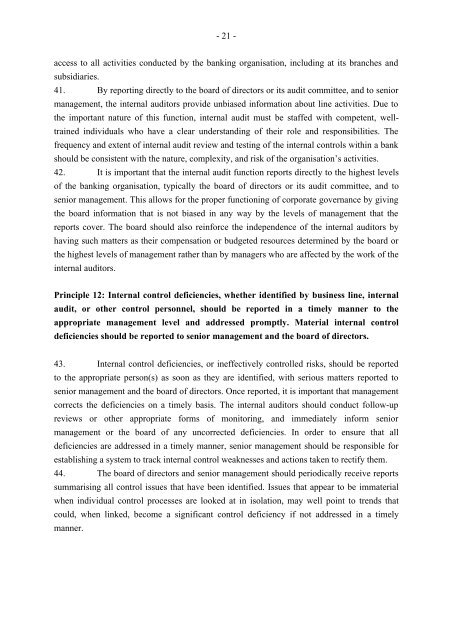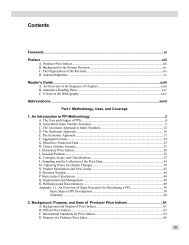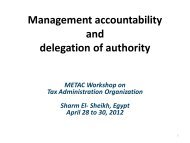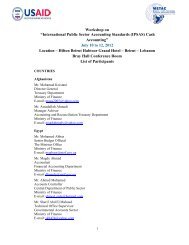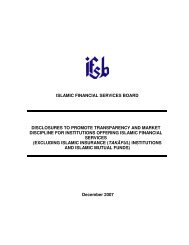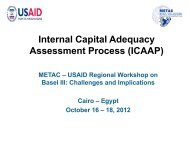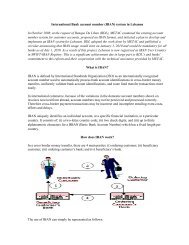Framework for Internal Control Systems in Banking Organisations
Framework for Internal Control Systems in Banking Organisations
Framework for Internal Control Systems in Banking Organisations
You also want an ePaper? Increase the reach of your titles
YUMPU automatically turns print PDFs into web optimized ePapers that Google loves.
- 21 -<br />
access to all activities conducted by the bank<strong>in</strong>g organisation, <strong>in</strong>clud<strong>in</strong>g at its branches and<br />
subsidiaries.<br />
41. By report<strong>in</strong>g directly to the board of directors or its audit committee, and to senior<br />
management, the <strong>in</strong>ternal auditors provide unbiased <strong>in</strong><strong>for</strong>mation about l<strong>in</strong>e activities. Due to<br />
the important nature of this function, <strong>in</strong>ternal audit must be staffed with competent, welltra<strong>in</strong>ed<br />
<strong>in</strong>dividuals who have a clear understand<strong>in</strong>g of their role and responsibilities. The<br />
frequency and extent of <strong>in</strong>ternal audit review and test<strong>in</strong>g of the <strong>in</strong>ternal controls with<strong>in</strong> a bank<br />
should be consistent with the nature, complexity, and risk of the organisation’s activities.<br />
42. It is important that the <strong>in</strong>ternal audit function reports directly to the highest levels<br />
of the bank<strong>in</strong>g organisation, typically the board of directors or its audit committee, and to<br />
senior management. This allows <strong>for</strong> the proper function<strong>in</strong>g of corporate governance by giv<strong>in</strong>g<br />
the board <strong>in</strong><strong>for</strong>mation that is not biased <strong>in</strong> any way by the levels of management that the<br />
reports cover. The board should also re<strong>in</strong><strong>for</strong>ce the <strong>in</strong>dependence of the <strong>in</strong>ternal auditors by<br />
hav<strong>in</strong>g such matters as their compensation or budgeted resources determ<strong>in</strong>ed by the board or<br />
the highest levels of management rather than by managers who are affected by the work of the<br />
<strong>in</strong>ternal auditors.<br />
Pr<strong>in</strong>ciple 12: <strong>Internal</strong> control deficiencies, whether identified by bus<strong>in</strong>ess l<strong>in</strong>e, <strong>in</strong>ternal<br />
audit, or other control personnel, should be reported <strong>in</strong> a timely manner to the<br />
appropriate management level and addressed promptly. Material <strong>in</strong>ternal control<br />
deficiencies should be reported to senior management and the board of directors.<br />
43. <strong>Internal</strong> control deficiencies, or <strong>in</strong>effectively controlled risks, should be reported<br />
to the appropriate person(s) as soon as they are identified, with serious matters reported to<br />
senior management and the board of directors. Once reported, it is important that management<br />
corrects the deficiencies on a timely basis. The <strong>in</strong>ternal auditors should conduct follow-up<br />
reviews or other appropriate <strong>for</strong>ms of monitor<strong>in</strong>g, and immediately <strong>in</strong><strong>for</strong>m senior<br />
management or the board of any uncorrected deficiencies. In order to ensure that all<br />
deficiencies are addressed <strong>in</strong> a timely manner, senior management should be responsible <strong>for</strong><br />
establish<strong>in</strong>g a system to track <strong>in</strong>ternal control weaknesses and actions taken to rectify them.<br />
44. The board of directors and senior management should periodically receive reports<br />
summaris<strong>in</strong>g all control issues that have been identified. Issues that appear to be immaterial<br />
when <strong>in</strong>dividual control processes are looked at <strong>in</strong> isolation, may well po<strong>in</strong>t to trends that<br />
could, when l<strong>in</strong>ked, become a significant control deficiency if not addressed <strong>in</strong> a timely<br />
manner.


